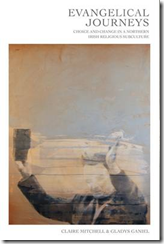 Previously I have shared reviews from academic journals of my book, co-authored with Claire Mitchell, Evangelical Journeys: Choice and Change in a Northern Irish Religious Subculture (UCD Press 2011). I have discovered another review, this one by Neil Southern, Senior Lecturer in Politics at Sheffield Hallam University, in the Journal of Contemporary Religion, 2013, V. 28, No. 3, pp. 542-544.
Previously I have shared reviews from academic journals of my book, co-authored with Claire Mitchell, Evangelical Journeys: Choice and Change in a Northern Irish Religious Subculture (UCD Press 2011). I have discovered another review, this one by Neil Southern, Senior Lecturer in Politics at Sheffield Hallam University, in the Journal of Contemporary Religion, 2013, V. 28, No. 3, pp. 542-544.
While copyright restrictions do not permit reproducing the review in full, I quote selectively from it below.
You can read other reviews of Evangelical Journeys, as well as my other books, here.
Review of Evangelical Journeys by Neil Southern, Journal of Contemporary Religion
This book makes an important contribution to understanding religious diversity within Protestantism in Northern Ireland. Accordingly, it allows us to view Protestantism not as a monolithic entity, but as something which is heterogeneous. It achieves this by focusing on the complexity and multifaceted character of the province’s evangelical community and accounts for the different life journeys embarked upon by a sample of those who belong to this religious sub-culture. Hence, it adds to the work of Steve Bruce which has discussed the general topic of Protestant diversity, but it provides a deeper understanding of the phenomenon by virtue of the qualitative research methodology adopted by the researchers and their area-based approach. Indeed, a very respectable and comprehensive body of research underpins the authors’ arguments, as 95 in-depth interviews were conducted during fieldwork.
… In focusing on the pathways of individuals, the authors do well in making the case for greater scholarly consideration of the part which personal choice plays in shaping the direction people’s journeys can take and that structural constrains do not tell the whole story.
In particular, chapter two invites the reader to reflect carefully on the debate regarding the role of religion in the Northern Irish conflict. This is a complicated area, as anyone interested in this topic will know. The commentators who have been keen to dismiss – out of hand – religion from the equation and argue that it has merely functioned as an ethnic marker would do well to ponder more fully the matter, having read the position taken by the two authors.
… The final chapter makes brief references to politics in a sub-section but does little to inform readers about the relationship of evangelicals’ religious and political identities – a significant factor in a society that continues to be deeply divided along national identity lines and which, in turn, spawns high levels of sectarianism and inter-communal animosity. Some evangelicals might well be using the post-Good Friday Agreement context as an opportunity to explore, as the authors put it, “their relationship with their Catholic neighbours more deeply” (188), but are these evangelicals becoming less unionist in their political convictions as a consequence? What impact, for example, does the adoption of a less exclusivist evangelical identity have on individuals’ political identity and voting preferences? This book notwithstanding, the relationship which evangelicals have to the political identities that they are most likely to find appealing in Northern Ireland, most notably, a Northern Irish or British identity, remains an under-researched topic.
… the extensive qualitative material which is used throughout the chapters affords the reader an excellent glimpse into the lives of respondents. This undoubtedly adds to our understanding of the mosaic quality of the evangelical community in Northern Ireland.